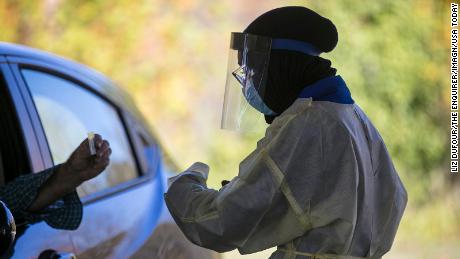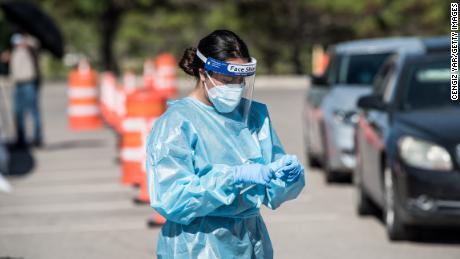Austin, Texas (CNN)It's mid-afternoon, and Shonda Johnson just wrapped up her third hair appointment of the day. Her phone rings, and it's her 13-year-old son calling from home. He wants to know if he can have some snacks.
"You can have a little bit," she tells him. "OK. Is that all you needed? OK. Bye-bye."
Johnson, a single mother and self-employed hair stylist at Anointed Hands Salon, is living like millions of Americans trying to navigate the delicate act of working in a pandemic-stricken economy -- while also making sure her son, who has asthma, stays healthy as he does virtual learning from home.
Adding to her juggling act, she's recently taken on the role of caretaker for her father who has Alzheimer's. He now lives at her apartment in Mesquite, Texas. Her son, Taylor, gave up his bedroom for his grandfather, and he sleeps on the same couch where he studies during the day.
Johnson said she feels like she's in "survival mode" and reaches a breaking point at times. She finds endurance through her faith.
"I don't know what God is doing, but I do trust him. And I know that he's strengthened me to be able to put on all these different hats," Johnson said. "A hat of hearing stories when people come and sit in your seat. A hat of being a mother. And now a hat of being a caregiver to someone that gave me life"
More than seven months into the pandemic, she and others are still trying to stay afloat as they battle coronavirus fatigue -- all the while bracing for another wave this winter that threatens to upend life all over again. Nationwide, the seven-day average of new cases is at an all-time high.
It's a scenario Johnson said she doesn't even want to think about. "We have no more cushion," she said.
She shut down her business for two months during the statewide closure of salons early in the pandemic. And due to sanitizing and social distance practices now, she can only see about half the clients she saw before Covid-19.
"We're trying to get our cushion back up," she said. "We have nothing else to fall back on right now."
A surge of cases in El Paso
Texas is one of many states seeing an uptick in cases. In El Paso, cases are straight-up surging. Hospitals are inundated, and the state is building negative pressure tents and using the convention center to house more patients. They're also clearing out a floor of a children's hospital for non-Covid-19 patients and air-lifting others to different parts of the state with more hospital space.
The El Paso County health department reported Tuesday an all-time high of hospitalizations, with 892 patients hospitalized due to the virus and 205 of those patients in ICU.
One of the major hospitals in El Paso, University Medical Center, was treating 195 Covid-19 patients as of Tuesday morning, a significant increase from the 20-30 patients it had a month ago.
"We're at the highest point we've ever been," said Ryan Mielke, spokesman for the hospital.
El Paso Mayor Dee Margo said Tuesday on CNN's "New Day" that 37% of cases from earlier this month were linked to big box stores or shopping, while about 22% were from restaurants, and roughly 20% were from travel to Mexico.
"We are trying to get our arms around it," he said. "I also think one of the issues is because we have not had that stimulus yet, and people are positive and showing up for work because that is their only paycheck."
Margo said the state also sent about 800 medical personnel, doctors, and respiratory therapists to help address the surge.
Restrictions bring layoffs, debt to an Austin dive bar
Over in Austin, Will Tanner is just now starting to partially reopen "Hole in the Wall," an iconic dive bar and music venue that's been around since 1974. The bar has hosted legendary musicians like Townes Van Zandt, Blaze Foley, Doug Sahm and Stevie Ray Vaughan.
Once a thriving spot for artists -- and even featured last year on "The Tonight Show Starring Jimmy Fallon" -- the bar became a ghostly-like space over the summer. Tanner had to lay off nearly 20 employees and go into debt just to keep the place in limbo.
"I was thinking how can I possibly survive being closed for three weeks, and three weeks turned into three months. Three months turned to seven months," he said.
After allowing bars to briefly reopen in May, Texas Gov. Greg Abbott ordered them to shut down again as cases in Texas began to skyrocket in late June. Bars statewide continued to struggle; "Hole in the Wall" was only open for three weeks before it had to close again for the summer surge.
Abbott, in early October, gave county judges the authority to allow bars to reopen at 50% capacity. While the Travis County judge is not allowing bars to open its doors in Austin, "Hole in the Wall" now has a restaurant permit and can partially reopen.
Tanner grew emotional when reflecting on the significance of the bar and the energy and joy that music provides -- a "magical" experience, he said, that's gone dark for so many during such a critical time.
He's excited about reopening partially, but he still has some anxiety about the safety and health of his customers, as well as their relatives or friends.
And while his bar may be legendary, it's the iconic image of another generation that's underwriting his optimism.
"I think when we figure this (Covid-19) thing out, it's gonna be like the end of World War II," he said. "It's gonna be just, you know, people in the streets and people making out. Hugging their friends. I think it's gonna be awesome and that's what I'm hanging on to."






